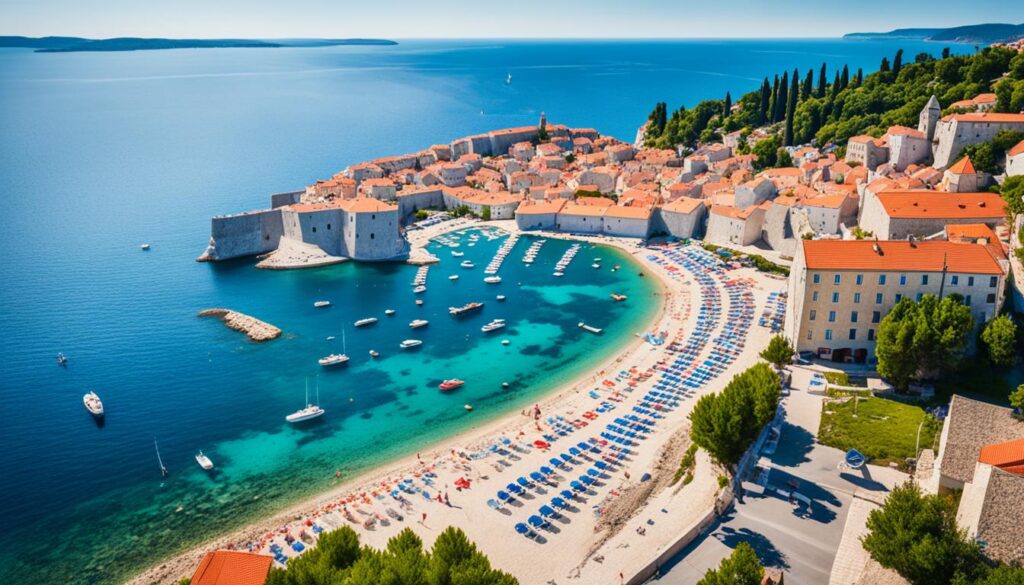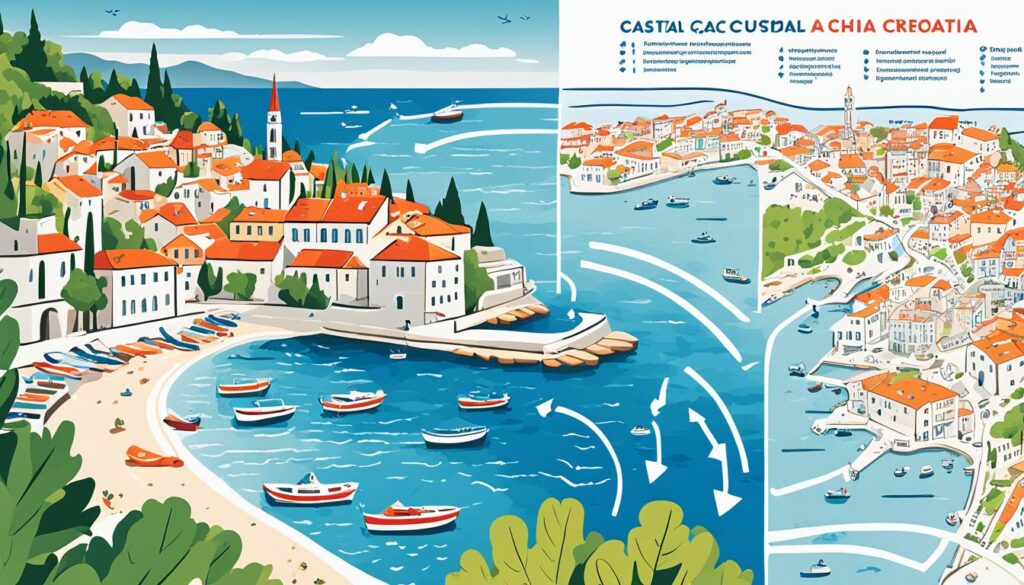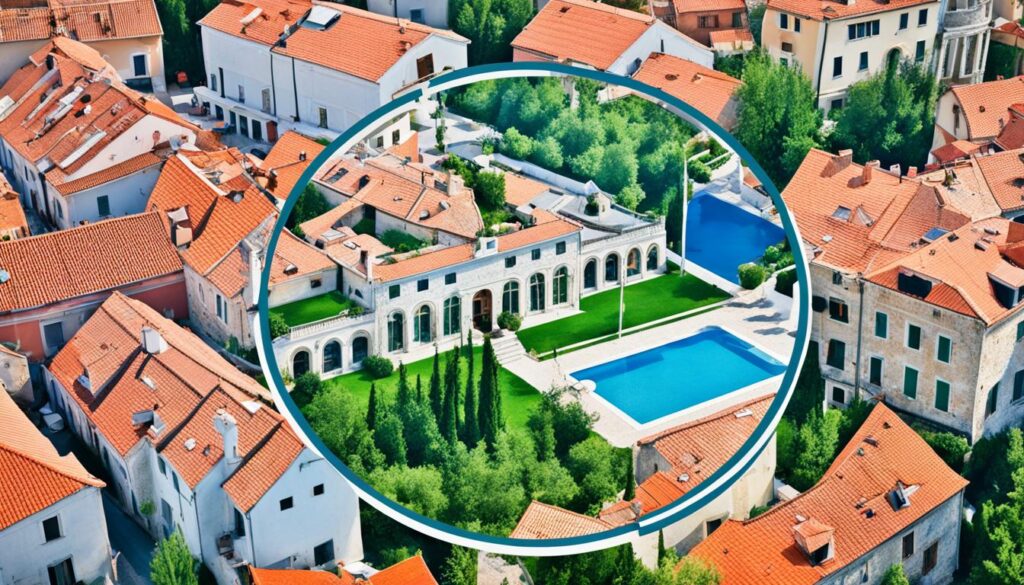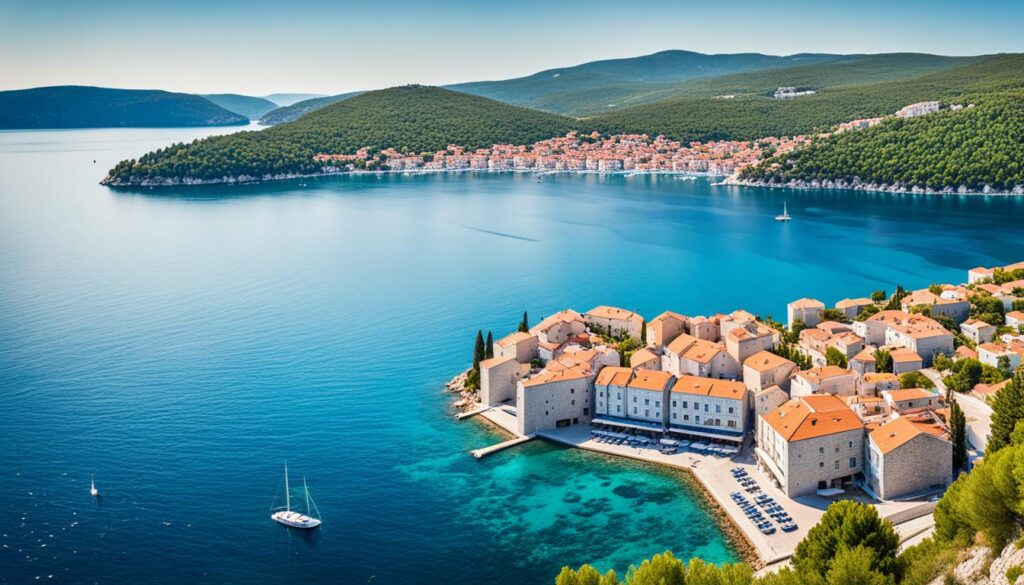As Croatia continues to capture the attention of global investors and expatriates alike, many often ask, Can Foreigners Buy Property In Croatia? This picturesque nation, known for its stunning coastlines and rich culture, offers a promising Real Estate Investment in Croatia for Non-Citizens. It is important to understand that while property ownership in Croatia for foreigners is indeed possible, specific regulations and prerequisites apply. Foreign buyers must be mindful of aspects such as reciprocity agreements and eligibility criteria to ensure a seamless investment experience. This section aims to provide a clear overview of the opportunities and challenges for international buyers considering Croatia as their property market of choice, emphasizing the significance of understanding the local laws that govern real estate transactions.
Key Takeaways
- Foreigners can purchase real estate in Croatia, but rules differ for EU and non-EU buyers.
- Croatia allows EU citizens to buy property under the same terms as Croatian nationals.
- Non-EU citizens must abide by reciprocity agreements to acquire property.
- Registration as a property owner can take up to sixty days.
- Rental yields in Croatia range between 1.7% and 4.4%.
Contact us if you are Interested in Buying Property Abroad!
Overview of the Croatian Real Estate Market
The Croatian real estate market has continued to thrive, making it a favorable destination for foreign investors. The stunning coastal areas, vibrant cities, and an attractive cost of living draw foreigners searching for both investment opportunities and vacation homes. In 2017, about 2,500 properties were sold to foreigners in Croatia1. By 2018, this number rose to 3,200, marking a 28% increase1. Such growth reflects the ongoing appeal of the Croatian real estate market.
Attraction for Foreign Investors
Foreign investors have become increasingly interested in Croatian real estate, highlighting the robust opportunities available. By 2022, 4,200 properties were sold to foreign investors, showing significant growth in demand1. The market’s friendly regulations allow foreigners to purchase various property types, as EU citizens can buy properties under the same conditions as locals2. With the boom in tourism, more foreigners seek investment opportunities in areas that are expected to appreciate in value.
Tourism and Its Impact on Property Prices
The booming tourism in Croatia has a direct impact on property prices and demand in key regions like Dubrovnik and Split. This influx of visitors has made real estate an attractive proposition as rental properties are in high demand. In 2023, sales to foreign investors are projected to reach around 4,500 properties1. Consequently, many investors capitalize on rental income from their investments, contributing to an upward trend in property values.
Can Foreigners Buy Property In Croatia

Foreign investors show a significant interest in the Croatian real estate market. Understanding the eligibility criteria is crucial for anyone considering property purchases, particularly for those outside the EU. The Reciprocity Agreement in Croatia plays a pivotal role in determining the property buying eligibility for foreigners.
Eligibility Criteria for Foreign Buyers
Foreign nationals can purchase various types of properties in Croatia, including houses, hotels, and residential buildings. For US citizens, the process is facilitated through a reciprocal agreement that permits them to acquire property similarly to Croatian citizens. Moreover, acquiring a Croatian tax ID (OIB) is essential for all property transactions, while opening a local bank account is advisable for smooth financial dealings3. There are no restrictions on the number of properties Americans can own3.
Reciprocity Agreement Considerations
Non-EU citizens must comply with specific regulations that hinge on the Reciprocity Agreement in Croatia. For instance, agricultural land purchases require additional approvals and often involve purchasing through a local company. A typical cost for a certificate confirming property as residential is around 6 euros, while registering the property purchase incurs fees of about 33 euros4. Understanding these regulations ensures a seamless purchasing experience for foreigners interested in tapping into the lucrative Croatian real estate market5.
Differences Between EU and Non-EU Buyers

When it comes to EU vs Non-EU Property Buying in Croatia, understanding the distinctions between EU and non-EU citizens is crucial. EU citizens generally enjoy a more straightforward path to purchasing property, whereas non-EU citizens face additional hurdles.
Buying Property as an EU Citizen
EU citizen property rights are quite favorable in Croatia. They can buy property without needing approval or permission from any governmental body. This means EU buyers can experience a streamlined process, allowing for quicker transactions once they identify the real estate they wish to purchase.
Buying Property as a Non-EU Citizen
In contrast, non-EU citizen buying restrictions present a significant challenge for foreign investors. Non-EU foreigners seeking to buy property must seek consent from the Ministry of Justice, a process that can take up to six months6. They are also prohibited from purchasing agricultural land, forest land, or any properties designated as protected or cultural monuments7. The real estate transfer tax remains at 3%, and VAT may apply based on the property type6.
The complexity for non-EU buyers continues with the requirement to provide substantial documentation, further complicating their purchase journey. Overall, EU citizens have a significant advantage in EU vs Non-EU Property Buying in Croatia, as they face less scrutiny and a more efficient methodology.
For further information on this subject, readers may refer to the detailed guidelines found here.
Understanding these differences is essential for anyone contemplating investing in Croatian real estate.
Legal Framework for Foreign Property Ownership in Croatia
The legal landscape pertaining to property ownership in Croatia is intricate and requires a thorough understanding of various factors. Foreign buyers must navigate the Legal Framework for Property Buying in Croatia, making it vital to familiarize themselves with Croatian Property Ownership Laws.
Applicable Laws and Regulations
Foreigners are typically allowed to purchase real estate in Croatia under the principle of reciprocity. This means that citizens from countries that permit Croatian citizens to buy property will enjoy the same rights when acquiring real estate in Croatia8. For EU citizens, the conditions for property acquisition mirror those for Croatian citizens, streamlining the process9. However, citizens from non-EU countries must obtain consent from the Ministry of Justice, which adds complexity and may prolong the acquisition timeline10.
Obtaining Necessary Permissions
For non-EU nationals, obtaining Necessary Permissions for Foreign Buyers is a crucial step in the property purchasing process. This entails submitting necessary documents and potentially waiting for approvals from Croatian authorities. The need for a unique identification number (OIB) and a Croatian bank account is essential for all foreign buyers before proceeding with any real estate transaction, including signing the purchase agreement8. Additionally, real estate sales tax, which stands at 3% of the property market value, applies to all purchases9. Engaging with local real estate agencies can facilitate navigating the intricacies of obtaining permissions and ensuring compliance with all regulations.
Steps to Buying Property in Croatia

Purchasing property in Croatia involves several key steps designed to ensure a smooth transaction. Understanding these Steps to Purchase Property in Croatia is crucial for both EU and non-EU citizens. The journey typically begins with careful research and culminates in the final securing of the property title.
Finding the Right Real Estate
Finding Real Estate in Croatia can be an exciting yet daunting task. Buyers should initiate their search on platforms like Njuškalo and Index Oglasi, which provide various listings. It’s important to identify the type of property that matches your needs and budget before proceeding.
Securing the Property
Once you find a suitable option, the next step involves drafting a pre-agreement contract, often referred to as a “kapara.” This helps in securing property title by providing a deposit, generally around 10% of the sale price. Acquiring a notarized version of the final contract is essential for registration with the local land registry, particularly for non-EU buyers who may experience additional legal complexities. To ensure adherence to local regulations, it is advisable to consult with legal experts throughout these processes as detailed resources are available.
Contact us if you are Interested in Buying Property Abroad!
Understanding Property Taxes and Fees

Foreign buyers in Croatia need to navigate a unique landscape of property taxes and associated fees. Among these, the Real Estate Transfer Fee is significant. This fee consists of a mandatory property transfer tax, currently set at 3% of the property’s market value at the point of acquisition11. Understanding these costs is essential for effective budgeting and financial planning during property transactions.
Real Estate Transfer Tax
As outlined, the Real Estate Transfer Tax is obligatory for all property owners, including foreign nationals. This tax represents a substantial part of the expenses associated with property purchases12. Alongside this tax, potential buyers should be aware of other associated costs involving legal services, notary fees, and registration expenses.
Other Associated Costs
The total cost of buying property in Croatia also includes several additional fees. Various legal fees usually range from 0.5% to 1.5% of the property’s purchase price, depending on the nature of the services provided by the lawyer. Real estate agency fees typically sit between 2% and 4% of the agreed purchase price, also subject to a 25% VAT1311. Other fees to budget for include khoảng €170 for property evaluations, approximately €5 for notary services, and up to €330 for a required court translator for non-Croatian buyers13.
Understanding these Property Taxes in Croatiais vital to ensure a smooth transaction and prevent unexpected financial burdens.
Residency Options for Property Buyers

Acquiring property in Croatia opens significant avenues for residency, appealing to many foreign investors. The most immediate pathway is through a Temporary Residency through Property, which allows buyers to stay in the country for up to one year. This initial residency does not permit work within Croatia, and while it cannot be renewed consecutively, buyers may reapply again later14. To qualify, the property must be residential, and the owner must reside there. Importantly, there is no stipulated minimum purchase price for eligibility and if married, both spouses must be listed as owners14.
Temporary Residency Through Property Ownership
The requirements for obtaining temporary residency based on property ownership include providing various documents such as a valid passport, a criminal background check, health insurance policy, proof of ownership, and evidence of financial capability14. Once approved, health insurance should be acquired with a one-time payment that covers one year’s premiums. The ownership must be registered with the land registry for verification, and candidates must meet certain financial thresholds that are adjusted according to average salaries14.
Long-Term Residency Possibilities
While the temporary residence does not lead directly to permanent residency, there are long-term residency options available that are contingent on naturalization rather than simply investing in real estate. Despite having no specific minimum investment requirement for a Golden Visa15, the pathway includes compliance with various conditions and laws governing residence in Croatia. Personal income tax rates are relevant to note, standing at 20% for earnings up to EUR 47,000 and 30% for higher incomes15. With a well-established framework, Croatia continues to attract foreign investment, boasting a promising environment for those looking to establish residency through property ownership.
Tips for a Successful Real Estate Purchase

When considering a successful property acquisition in Croatia, it is crucial to use the expertise of Real Estate Agents in Croatia. These professionals can guide buyers through the intricacies of the local market and help navigate the legal landscape. A knowledgeable agent can significantly simplify the process, providing insights and access to listings that align with your preferences.
Working with Real Estate Agents
Engaging an experienced agent greatly enhances the home-buying experience. They offer valuable local knowledge, assist with price negotiations, and handle paperwork. In Croatia, the typical real estate commission charged by agents ranges from 2% to 3% of the purchase price, which is borne by the buyer16. Choosing a trustworthy and professionally accredited agent can stave off potential pitfalls and facilitate smoother transactions.
Conducting Due Diligence
Conducting thorough Due Diligence When Buying Property is essential. This includes reviewing property records, confirming ownership, and validating all necessary documentation before making a final decision. Buyers should ensure that all conditions are met, including any required permissions, especially for non-EU citizens. Notably, the procedure to request permission from the Ministry of Justice to purchase property costs approximately 5 euros, and the review process may take up to 60 days4. Furthermore, it is critical to understand the associated costs involved in the process, such as the real estate transfer tax, which is set at 3% of the final purchase price16.
| Cost Type | Approximate Percentage/Amount | Who Pays |
|---|---|---|
| Real Estate Commission | 2% – 3% | Buyer |
| Legal Fees & Other Costs | 1% – 3% | Buyer |
| Real Estate Transfer Tax | 3% of Purchase Price | Buyer |
| Deposit When Buying | 10% of Sales Price | Buyer |
| Property Registration Fee | 33 euros | Buyer |
By employing these Successful Property Purchase Tips, buyers can enhance their likelihood of making a sound investment in the Croatian real estate market, ensuring all necessary precautions and legal steps are effectively managed164.
Conclusion
In conclusion, Croatia provides a vibrant landscape for Foreign Real Estate Investment in Croatia, rich with opportunities for both personal enjoyment and financial gain. However, navigating the process involves understanding key regulations, including eligibility criteria and necessary permissions that can streamline the journey of buying property. All buyers should be aware that a real estate transfer tax of 3% applies on purchased properties, with specific exclusions such as new constructions under two years not incurring this cost1718.
The Summary of Property Buying in Croatia highlights acquiring property as a process requiring diligence and professional guidance. Working with reliable agents can help mitigate risks and ease complexities, while local experts like the San Patrik Real Estate Agency are equipped to assist foreign buyers in understanding legal requirements and market dynamics Learn more about the process here.
Ultimately, ensuring legal compliance and thorough planning fosters a successful investment experience in Croatia. As you embark on this exciting journey, keep in mind the Final Thoughts on Buying Property: with the right support and informed decisions, investing in a property in this beautiful country can yield rewarding results for years to come171819.
Contact us if you are Interested in Buying Property Abroad!
FAQ
Can foreigners purchase property in Croatia?
What are the eligibility criteria for foreign buyers in Croatia?
Is there a difference between EU and non-EU buyers when purchasing property in Croatia?
What steps should I take when buying property in Croatia?
What are the taxes and fees involved in purchasing property in Croatia?
Can purchasing property in Croatia provide residency options for foreigners?
Why is it important to work with a real estate agent when buying in Croatia?
What is the significance of conducting due diligence when buying property?
Source Links
- https://www.croreal.com/blog/en/analysis-of-real-estate-sales-to-foreigners-in-croatia-2024
- https://sanpatrik.co/kako-stranci-mogu-kupiti-kucu-ili-stan-u-hrvatskoj/
- https://investropa.com/blogs/news/croatia-us-citizen-property-ownership
- https://www.expatincroatia.com/buy-real-estate/
- https://lawyerscroatia.com/purchase-a-property-in-croatia/
- https://www.boriclaw.com/en/post/buying-real-estate-in-croatia
- https://wise.com/gb/blog/buying-property-in-croatia
- https://sarusic.eu/real-estate-buying-and-selling-in-croatia-a-guide-for-investors/
- https://nekretnine-stangrad.hr/about-us/topics/buying-real-estate/procedure-for-buying-real-estate-in-croatia-for-foreigners
- https://www.expatincroatia.com/buying-croatian-property-tips/
- https://croatiapropertysale.com/what-are-fees-when-buying-property-in-croatia/
- https://www.croatiapropertysales.com/frequently-asked-questions/
- https://www.expatincroatia.com/croatia-real-estate-costs/
- https://www.expatincroatia.com/property-residence-permit/
- https://companyformationcroatia.com/citizenship-by-investment-in-croatia/
- https://croatiarealestates.com/before-you-buy-property-in-croatia-7-things-to-consider/
- https://mediterraneainvest.com/buying-abroad/buying-in-croatia/
- https://www.terradalmatica.hr/en/blog/what-do-foreigners-need-to-know-about-buying-their-first-property-in-croatia
- https://regent.hr/en/vodic-za-strane-drzavljane/

Comments